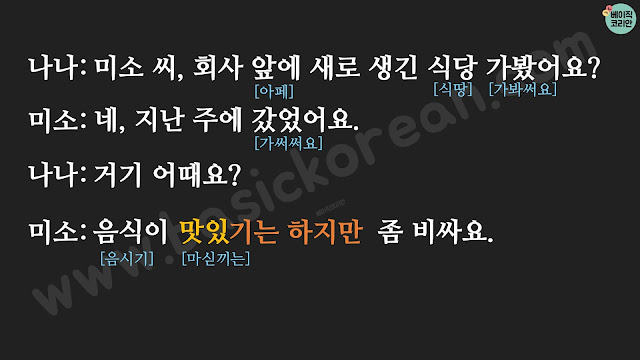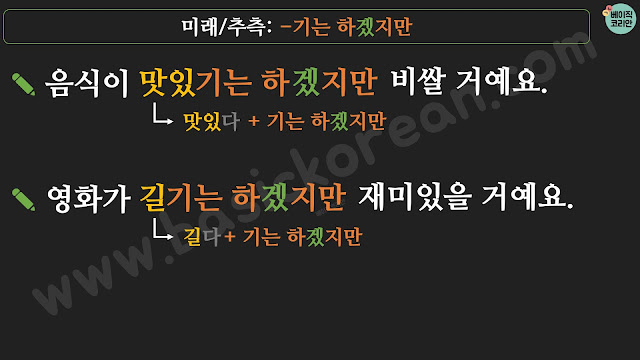Learn Korean: Korean Grammar 106: A/V-기는 하지만, N-(이)기는 하지만
In this lesson, we're going to learn A/V-기는 하지만, N-(이)기는 하지만.
음식이 맛있기는 하지만 좀 비싸요.
🎬 Korean Grammar: https://youtu.be/eQuG7fI6oS0
 |
| A/V-기는 하지만, N-(이)기는 하지만 |
- 나나: 미소 씨, 회사 앞에 새로 생긴 식당 가봤어요?
(Miso, have you been to the new restaurant in front of the company?)
- 미소: 네, 갔었어요.
(Yes, I went there last week.)
- 나나: 거기 어때요?
(How about there?)
- 미소: 음식이 맛있기는 하지만 좀 비싸요.
(The food is good, but it's a bit expensive.)
The grammar we are going to learn is '맛있기는 하지만.'
 |
| A/V-기는 하지만, N-(이)기는 하지만 |
► '기는 하지만' and '(이)기는 하지만' attach an adjective/a verb stem and a noun respectively.
► It is used to talk about a different or opposite content from the preceding one while you acknowledge the preceding content.
► 기는 → 긴: when you speak, you can shorten '기는' to '긴.'
(1) Present: -기는 하지만
▶ 음식이 맛있기는 하지만 비싸요. (맛있다 + 기는 하지만)
- '음식이 맛있어요. 비싸요.' (The food is delicious. It is expensive.)
- '음식이 맛있어요.' (The food is delicious). You admit this.
- But you are saying '비싸요.'(It's expensive.) You also say the opposite aspect.
- Like this, while you admit the first fact and then you talk about the different or opposite fact later, you can connect these two sentences using '-기는 하지만.'
- Then you can say ‘음식이 맛있기는 하지만 비싸요.' (The food is delicious, but it is expensive.)
- '맛있기는 하지만' is a combination of the adjective '맛있다 and '기는 하지만.'
- You admit the first fact: '음식이 맛있기는 하지만', and you also say the opposite fact:'비싸요.'
 |
| A/V-기는 하지만, N-(이)기는 하지만 |
▶ 영화가 길기는 하지만 재미있어요. (길다 + 기는 하지만)
(The movie is long, but it is interesting.)
- 영화가 길어요. 재미있어요. (The movie is long. It's interesting.)
- 영화가 길어요. The movie is long. You admit this.
- But you are saying '재미있어요.'(It's interesting.) You also say the opposite fact.
- Like this, while you admit the first fact and then you talk about the different or opposite fact later, you can connect these two sentences using '-기는 하지만.'
- Then you can say ‘영화가 길기는 하지만 재미있어요. (The movie is long, but it is interesting.)
- Here, '길기는 하지만' is a combination of the adjective '길다 and '기는 하지만.'
- You admit the first fact: '영화가 길기는 하지만' and you also say the opposite fact: '재미있어요.'
 |
| A/V-기는 하지만, N-(이)기는 하지만 |
(2) Past: -기는 했지만
- The past form is '-기는 했지만'.
▶ 음식이 맛있기는 했지만 비쌌어요. (맛있다 + 기는 했지만)
(The food is delicious, but it was expensive.)
- '맛있기는 했지만' is a combination of the adjective '맛있다 and '기는 했지만.'
▶ 영화가 길기는 했지만 재미있었어요. (길다 + 기는 했지만)
(The movie was long, but it was interesting.)
- '길기는 했지만' is a combination of the adjective '길다 and '기는 했지만.'
 |
| A/V-기는 했지만 |
(3) Future/Speculation: -기는 하겠지만
- the future/speculation form is ‘-기는 하겠지만’
▶ 음식이 맛있기는 하겠지만 비쌀 거예요. (맛있다 + 기는 하겠지만)
(The food will be delicious, but it will be expensive.)
- '맛있기는 하겠지만' is a combination of the adjective '맛있다 and '기는 하겠지만.'
▶ 영화가 길기는 하겠지만 재미있을 거예요. (길다 + 기는 하겠지만)
(The movie will be long, but it will be interesting.)
- '길기는 하겠지만' is a combination of the adjective '길다 and '기는 하겠지만.'
 |
| A/V-기는 하겠지만 |
4. Combination Information
(1) Adjective/Verb | 받침 O & X: -기는 하지만 (했지만/하겠지만)
- Whether an adjective/verb stem has the final consonant or not, '-기는 하지만' is used.
- The same principle goes for the past form '-기는 했지만' and the future/speculation form '-기는 하겠지만'.
(Adjective)
- Final Consonant O: 작다 + 기는 하지만 → 작기는 하지만
- Final Consonant X: 크다 + 기는 하지만 → 크기는 하지만
(Verb)
- Final Consonant O: 먹다+ + 기는 하지만 → 먹기는 하지만
- Final Consonant X: 오다 + 기는 하지만 → 오기는 하지만
 |
| A/V-기는 하지만 |
(2) Noun
1) Final Consonant O: -이기는 하지만
- When the preceding noun has the final consonant, '-이기는 하지만' is used.
- 휴일 + 이기는 하지만 → 휴일이기는 하지만
- 학생 + 이기는 하지만 → 학생이기는 하지만
2) Final Consonant X: -기는 하지만
- When the preceding noun does not have the final consonant, '기는 하지' is used.
- 가수 + 기는 하지만 → 가수기는 하지만
- 영화 + 기는 하지만 → 영화기는 하지만
 |
| N-(이)기는 하지만 |
5. Practice
- 커피를 마시기는 하지만 좋아하지는 않아요. (마시다 + 기는 하지만)
(I drink coffee, but I don't like it.)
- 한국어를 배우는 것이 어렵기는 하지만 재미있어요. (어렵다 + 기는 하지만)
(It's difficult to learn Korean, but it's fun.)
- 제가 한국 사람이기는 하지만 매운 음식은 잘 못 먹어요. (한국 사람 + 이기는 하지만)
(Although I am Korean, I am not good at eating spicy food.)
 |
| A/V-기는 하지만, N-(이)기는 하지만 |
- 미소: 나나 씨, 이사할 집 구했어요?
(Nana, did you find a house to move to?)
- 나나: 지금 두 집 중에서 고민하고 있어요.
(I'm thinking between two houses.)
하나는 회사에서 가깝기는 하지만 길가에 있어서 좀 시끄럽고요.
(One is close to the company, but it's a little noisy along the road)
다른 집은 회사에서 조금 멀기는 하지만 조용하고요.
(The other house is a little far from the company, but it's quiet.)
- The grammar we've learned is '가깝기는 하지만 and 멀기는 하지만.'
→ 가깝다 + 기는 하지만
→ 멀다 + 기는 하지만
Thank you~!
#베이직코리안 #한국어문법 #Basickorean #Koreangrammar
_basickorean.jpg)
